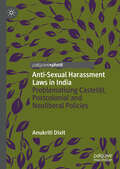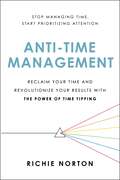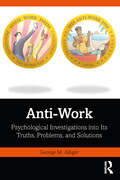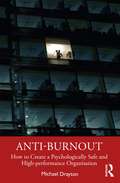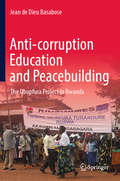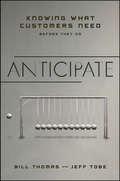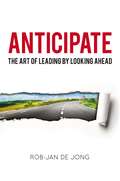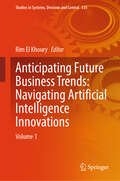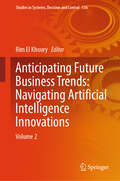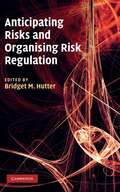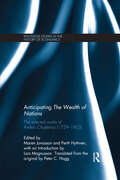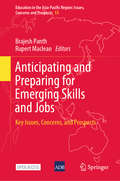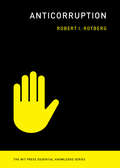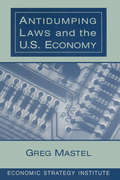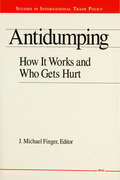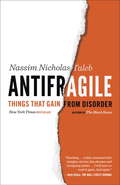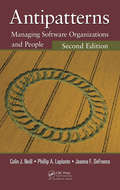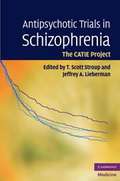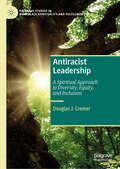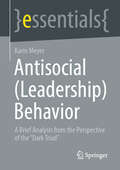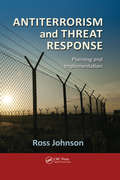- Table View
- List View
Anti-Sexual Harassment Laws in India: Problematising Caste(d), Postcolonial and Neoliberal Policies
by Anukriti DixitThrough a deep dive into specific ‘problem’ representations in the policymaking on anti- sexual harassment at workplaces (SHW) in India, this book makes broader sense of gendered, caste-based and colonial regimes of power. The author takes a poststructuralist feminist approach to illustrate how these policies disregard collective action and function as gendering and caste-ing practices. The book posits that India’s anti-SHW policies produce specific ‘problems’ and subjects while neglecting certain other ‘problem’ and subject formulations. The author offers guidelines for how diverse subjects must be given equal epistemic credibility to make the policy milieu intersectionally equitable. This book will be of interest to scholars and policymakers in the fields of Gender Studies, Law, Sociology, and Organizational Studies.
Anti-Terrorism Law and Foreign Terrorist Fighters (Routledge Research in Terrorism and the Law)
by Jessie Blackbourn Deniz Kayis Nicola McGarrityJessie Blackbourn is a research fellow at the Centre for Socio-Legal Studies at the University of Oxford, UK. Deniz Kayis is currently the Associate for Chief Justice Allsop AO of the Federal Court of Australia. Nicola McGarrity is a senior lecturer and the Director of the Terrorism Law Reform Project at the University of New South Wales, Australia.
Anti-Time Management: Reclaim Your Time and Revolutionize Your Results with the Power of Time Tipping
by Richie NortonFind your motivation, prioritize your ideals, and create a flexible work-life lifestyle—no matter how busy or successful you are—with Anti-Time ManagementWhy Anti-Time Management? Discover the answer to the age-old question of &“work-life balance&” and what to do about it. Award-winning author Richie Norton brings you into the future with the power of Time Tipping, a framework that allows you to live and work wherever you choose. Enjoy expansive freedom by prioritizing attention, not managing time. What would your life look like today if you had already achieved what you want? Norton delivers an innovative roadmap that allows you to get your time back, how to change how you&’re paid, and how to protect and expand your time around your values by integrating revolutionary principles like: Project Stacking: How to single-task multiple, lucrative projects Work Syncing: How to bring work-life ideals in concert, creating space Expert Sourcing: How to design your work around results, not means Inspired by great personal loss, Norton shares how he and his family live with no regrets and how attention prioritization and time creation are learnable skills despite hardships. Anti-Time Management will help you be present for the people, projects, plans and priorities that matter most. Like light through a prism, you can purposefully create asymmetrical results by making small, intentional decisions on one side of your life and work to create brilliant strobes of possibilities on the other.
Anti-Work: Psychological Investigations into Its Truths, Problems, and Solutions
by George M. AlligerThe first book to delineate anti-work in a systematic fashion by identifying and compiling positions from a wide spread of literature, Anti- Work: Psychological Investigations into Its Truths, Problems, and Solutions defines the tenets of anti-work, reviews them from a psychological and historical point of view, and offers solutions to aid the average person in his or her struggle with work. Anti-work thinkers have vigorously argued that work entails a submission of the human will that is constraining and even ultimately damaging. The author has refined 18 tenets of anti-work from the literature, which range from the suggestion that all jobs are bad, to the remarkable ability of modern capitalist enterprises to build "job engagement" among workers, to the proposal of alternative work- deemphasized worlds. Anti-Work begins with a discussion of these tenets, in particular the submission of the will required by work, followed by an overview of topics such as worker resistance, merit, and precarious work. The second part of the book unfolds various possible human responses to the work problem, such as detachment, thinking while working, and right livelihood. In the third part, several lessons about anti-work are drawn from parables, koans, and tales. Discussions of cults and work, working from home, unions, and cooperatives, as well as lessons from Buddhism, Hinduism, and Christianity, offer additional perspectives on the topic of work and provide guidance on developing a helpful attitude toward it. By highlighting the tensions that exist between anti-work and pro-work positions, the book provides new ways to view and plan life, and will give thought- provoking and valuable insights for students, instructors, and practitioners in industrial and organizational psychology and related fields, as well as all people who have worked, will work, have never worked, or will never work.
Anti-burnout: How to Create a Psychologically Safe and High-performance Organisation
by Michael DraytonBurnout results in people feeling exhausted, cynical, detached and hopeless – even depressed and anxious. This book looks at burnout from an individual, group and organisational perspective. It uses anecdotes from the author’s life; and examples from literature, poetry and art to bring the subject to life. Based on the latest scientific thinking on burnout and evidence-based ideas, this practical, easy read book gives leaders the knowledge they need to create a psychologically healthy and high performance culture at work. After reading this book, you will understand more about burnout than 90 per cent of the population. You will know what to do to prevent burnout in other people and in yourself. Anti-burnout is an academically rigorous book, written in a friendly, engaging, conversational style. It contains lots of anecdotes, examples from the arts and stories that illustrate and bring to life the practical advice on preventing burnout. Anti-burnout will answer these questions: What exactly is burnout? How does burnout affect individuals, teams and organisations? What causes burnout? How can I understand and support people with burnout? How can I prevent myself from burning out? What are the obstacles to preventing burnout? How does remote working affect burnout? What can I do to create a workplace culture that prevents burnout? This book is helpful because it relates the scientific literature on burnout to real life. Anti-burnout looks at the individual factors in burnout, including personality and mental health. It also looks at how the dynamics of teams and how work is organised relate to burnout. Finally, the book investigates organisational culture, leadership and burnout. This book is essential reading for leaders and managers who want to minimise burnout in people in their organisation. It will also be essential reading for anyone with an interest in mental well-being at work such as occupational health practitioners, researchers and human resource professionals.
Anti-corruption Education and Peacebuilding: The Ubupfura Project in Rwanda
by Jean de BasaboseThis study explores corruption in Rwanda and highlights the necessity of developing anti-corruption education as a way of combating corruption. It argues that an effective campaign against corruption should consider promoting anti-corruption education with the aim of enabling present and future generations to maintain and live out the Ubupfura (meaning "trust/respect") ethical values. Considering the link between anti-corruption and peacebuilding efforts, as explained in this study, it is underlined that continuous efforts to raise such generations could undoubtedly move Rwandan society toward a sustainable peace. Peacebuilders, anti-corruption agents, and public policymakers are the primary beneficiaries of the study.
Anti-money Laundering Law: Socio-legal Perspectives on the Effectiveness of German Practices (International Criminal Justice Series #12)
by Verena ZoppeiIn the aftermath of recent multiple leaks such as the Panama Papers, the Swiss leaks, and the Bahama leaks, this book offers an interesting view on the underlying conflicting interests that impede the adoption of more effective legislation to stop money laundering by way of the financial system. The central position of the book is that the declared goals underlying the criminalization of money laundering have not been fulfilled. The effectiveness of the anti-money laundering regime in Germany is assessed by examining the indirect effects, collateral consequences, and positive interpretations of the law in action and of the law inaction; reducing the issue to a question of symbolic effectiveness does not reflect the complexity of the matter. What is demonstrated, is that the goals attributed to the regime were too ambitious, and that a lower degree of effectiveness has been accepted in order to balance the inherent political, economic and financial conflicting interests. Unlike other volumes focusing on this issue, this book deals with the implementation of the legislation and the consequences thereof, and is primarily aimed at legal sociologists, sociology of law researchers, criminal lawyers, criminologists with an interest in white collar crime and political scientists studying measures against illicit financial flows and the concrete implementation of anti-money laundering laws. The book will also be of interest to policymakers and consultants, as well as policymakers and consultants at a German level for instance working on improving the instruments to fight organized crime and preventing the financing of terrorism through money laundering. The complexity of the anti-money laundering regime and all the variables are exhaustively and critically reviewed in the assessment, thereby providing complete instructions for future legislative steps. The case study regarding the situation in Germany maximizes readers' insights into concrete effects of the implementation of international anti-money laundering standards at a national level, and the opinions of professionals working in the field and of experts on the law-making process are also illumination. Moreover, the book equips non-German speakers with the information needed to deal with the extensive German legal scholarly production on article 261 of the German criminal code and the current internal political debate on the matter.
Anticipate
by Bill Thomas Jeff TobeDesign and implement the ideal customer focus Anticipate provides business readers with a practical how-to approach for taking their customer-supplier relationship to one that is more sustainable and more mutually profitable. Much of the discussion on customer experience has centered on the hospitality or retail industries and has showcased the discrete techniques organizations use to deliver better service and create more satisfied customers. Anticipate extends and integrates those techniques to deliver an end-to-end customer experience that can be applied in any industry, by any type of organization. Get proven guidance on how to design and implement a customer-focused journey that moves beyond the transaction and satisfied customers, to a relationship and culture that creates and leverages loyalty - and the profitability that comes with it. Explains proprietary methods--such as the Customer Focus Maturity Model ® and Value Chain Labs ® --that teach readers the steps and tools organizations use to create, drive and optimize their customer focus.Authors Bill Thomas and Jeff Tobe have used their 10-point framework to guide Fortune 500's, start-ups as well as non-profits in charting a customer-focused journey that matures, anticipates and delivers increasing levels of loyalty and profitability with their customers, and across their broader value chain.Anticipate will provide you with field-proven steps, tools and examples that you'll use to take your customer-focused strategy, execution and culture to the ideal level.
Anticipate: The Art of Leading by Looking Ahead
by Rob-Jan de JongBusiness schools, leadership gurus, and strategy guides agree--leaders must have a vision. But the sad truth is that most don't...or at least not one that compels, inspires, and energizes their people. How can something so essential be practiced so little in real life? Vision may sound like a rare quality, unattainable by all except a select few--but nothing could be further from the truth. Anyone can expand their visionary capacity. You just need to learn how. In Anticipate, strategy and leadership expert Rob-Jan de Jong explains that to develop vision you must sharpen two key skills. The first is the ability to see things early--spotting the first hints of change on the horizon. The second is the power to connect the dots--turning those clues into a gripping story about the future of your organization and industry. Packed with stories and practices, Anticipate provides proven techniques for looking ahead and exploring many plausible futures--including the author's trademarked FuturePriming process, which helps distinguish signal from noise. You will discover how to: Tap into your imagination and open yourself to the unconventional * Become better at seeing things early * Frame the big-picture view that provides direction for the future * Communicate your vision in a way that engages others and provokes action * And more When you anticipate change before your competitors, you create enormous strategic advantage. That's what visionaries do...and now so can you.
Anticipating Balance of Payments Crises The Role of Early Warning Systems
by Catherine A. Pattillo Andrew Berg Gian Maria Milesi-FerrettiA report from the International Monetary Fund.
Anticipating Future Business Trends: Volume 1 (Studies in Systems, Decision and Control #535)
by Rim El KhouryIn an age marked by swift technological advancements, businesses find themselves amid unparalleled challenges and opportunities. "Future Business: Anticipating Technological Trends" aims to deliver a comprehensive exploration of the dynamic technological landscape and its profound impact on the business world. This groundbreaking book intends to serve as an invaluable guide for entrepreneurs, business leaders, and innovators, providing them with the tools to anticipate and harness emerging technological trends for a competitive edge in the global market. This book represents a pioneering exploration at the confluence of technology and business evolution. In a time where everything is turning digital, the book strives to empower business leaders, entrepreneurs, and professionals with the knowledge and insights essential for navigating the ever-shifting terrain of technology and its influence on the future of business. This book sets the tone by emphasizing the critical role of technology in shaping the future of business. It will highlight the rapid pace of technological advancements and their far-reaching implications, setting the stage for a deep dive into the key trends that will define the future of business. "Future Business: Anticipating Technological Trends" promises to be an indispensable guide for those seeking to stay ahead in the competitive world of business. By providing actionable insights and strategic foresight, this book aims to empower readers to harness the full potential of emerging technologies for sustainable business success.
Anticipating Future Business Trends: Volume 2 (Studies in Systems, Decision and Control #536)
by Rim El KhouryIn an age marked by swift technological advancements, businesses find themselves amidst unparalleled challenges and opportunities. This book aims to deliver a comprehensive exploration of the dynamic technological landscape and its profound impact on the business world. This groundbreaking book intends to serve as an invaluable guide for entrepreneurs, business leaders, and innovators, providing them with the tools to anticipate and harness emerging technological trends for a competitive edge in the global market. This book represents a pioneering exploration at the confluence of technology and business evolution. In a time where everything is turning digital, the book strives to empower business leaders, entrepreneurs, and professionals with the knowledge and insights essential for navigating the ever-shifting terrain of technology and its influence on the future of business. This book sets the tone by emphasizing the critical role of technology in shaping the future of business. It highlights the rapid pace of technological advancements and their far-reaching implications, setting the stage for a deep dive into the key trends that will define the future of business. This book promises to be an indispensable guide for those seeking to stay ahead in the competitive world of business. By providing actionable insights and strategic foresight, this book aims to empower readers to harness the full potential of emerging technologies for sustainable business success.
Anticipating Risks and Organising Risk Regulation
by Bridget M. HutterAnticipating risks has become an obsession of the early twenty-first century. Private and public sector organisations increasingly devote resources to risk prevention and contingency planning to manage risk events should they occur. This 2010 book shows how we can organise our social, organisational and regulatory policy systems to cope better with the array of local and transnational risks we regularly encounter. Contributors from a range of disciplines - including finance, history, law, management, political science, social psychology, sociology and disaster studies - consider threats, vulnerabilities and insecurities alongside social and organisational sources of resilience and security. These issues are introduced and discussed through a fascinating and diverse set of topics, including myxomatosis, the 2012 Olympic Games, gene therapy and the financial crisis. This is an important book for academics and policy makers who wish to understand the dilemmas generated in the anticipation and management of risks.
Anticipating The Wealth of Nations: The Selected Works of Anders Chydenius, 1729–1803 (Routledge Studies in the History of Economics #139)
by Anders ChydeniusThe book consists of eleven of the most important writings of Anders Chydenius, an eighteenth century pioneer of freedom and democracy. Thematically they touch upon subject areas such as the freedom of trade and industry, emigration, the monetary system of the Swedish realm in the eighteenth century, the freedom of the press (or as Chydenius said: the freedom of writing and printing), the freedom of information, the rights of the rural working class and the freedom of religion. The book also includes a comprehensive biography of Chydenius written by Lars Magnusson together with commentaries and explanatory notes to each text.
Anticipating and Preparing for Emerging Skills and Jobs: Key Issues, Concerns, and Prospects (Education in the Asia-Pacific Region: Issues, Concerns and Prospects #55)
by Rupert Maclean Brajesh PanthThis open access book analyzes the main drivers that are influencing the dramatic evolution of work in Asia and the Pacific and identifies the implications for education and training in the region. It also assesses how education and training philosophies, curricula, and pedagogy can be reshaped to produce workers with the skills required to meet the emerging demands of the Fourth Industrial Revolution.The book’s 40 articles cover a wide range of topics and reflect the diverse perspectives of the eminent policy makers, practitioners, and researchers who authored them. To maximize its potential impact, this Springer-Asian Development Bank co-publication has been made available as open access.
Anticorruption (The MIT Press Essential Knowledge Series)
by Robert I. RotbergPresident Emeritus of the World Peace Foundation and Fellow of the American Academy of Arts and Sciences, Robert I. Rotberg, showcases how to win the ever-raging anticorruption battle, through this guide for citizens and politicians on either side of the aisle. The phenomenon of corruption has existed since antiquity; from ancient Mesopotamia to our modern-day high-level ethical morass, people have sought a leg up, a shortcut, or an end run to power and influence. In this volume in the MIT Press Essential Knowledge series, Robert Rotberg, a recognized authority on governance and international relations, offers a definitive guide to corruption and anticorruption, charting the evolution of corruption and offering recommendations on how to reduce its power and spread. The most important component of anticorruption efforts, he argues, is leadership that is committed to changing dominant political cultures.
Antidumping Laws and the U.S. Economy
by Greg MastelThis volume reviews the goals, operation, and history of American antidumping laws coupled with a strategy for using those laws to promote U.S. trade policy and economic objectives in the post-Uruguay Round GATT talks.
Antidumping: How It Works and Who Gets Hurt (Studies In International Economics)
by J. Michael FingerAntidumping is a threat to the liberal trading system that post-World War II Western leadership struggled courageously and effectively to create. It offers a GATT-legal means to destroy the GATT system, leading to restrictions on more U.S. imports than even the Multi-Fibre Arrangement. This book presents studies of five industries whose exports have been hard hit by antidumping actions. Each of these studies avoids the legalisms and the jargon of antidumping and answers a straightforward question: was the national economic interest of either the exporting or the importing country improved by the antidumping actions that were taken? The contributors not only ask questions and present viable answers, but also provide a proposal that offers both consistence with GATT and good economics.This book will be of interest to lawyers, political scientists, economists, and business people. It has intentionally avoided the specialized language of trade regulation so that it may be more readily accessible to anyone interested in international commercial policy.
Antifragile: Things That Gain from Disorder (Incerto #3)
by Nassim Nicholas TalebAntifragile is a standalone book in Nassim Nicholas Taleb's landmark Incerto series, an investigation of opacity, luck, uncertainty, probability, human error, risk, and decision-making in a world we don't understand. The other books in the series are Fooled by Randomness, The Black Swan, and The Bed of Procrustes.Nassim Nicholas Taleb, the bestselling author of The Black Swan and one of the foremost thinkers of our time, reveals how to thrive in an uncertain world. Just as human bones get stronger when subjected to stress and tension, and rumors or riots intensify when someone tries to repress them, many things in life benefit from stress, disorder, volatility, and turmoil. What Taleb has identified and calls "antifragile" is that category of things that not only gain from chaos but need it in order to survive and flourish. In The Black Swan, Taleb showed us that highly improbable and unpredictable events underlie almost everything about our world. In Antifragile, Taleb stands uncertainty on its head, making it desirable, even necessary, and proposes that things be built in an antifragile manner. The antifragile is beyond the resilient or robust. The resilient resists shocks and stays the same; the antifragile gets better and better. Furthermore, the antifragile is immune to prediction errors and protected from adverse events. Why is the city-state better than the nation-state, why is debt bad for you, and why is what we call "efficient" not efficient at all? Why do government responses and social policies protect the strong and hurt the weak? Why should you write your resignation letter before even starting on the job? How did the sinking of the Titanic save lives? The book spans innovation by trial and error, life decisions, politics, urban planning, war, personal finance, economic systems, and medicine. And throughout, in addition to the street wisdom of Fat Tony of Brooklyn, the voices and recipes of ancient wisdom, from Roman, Greek, Semitic, and medieval sources, are loud and clear. Antifragile is a blueprint for living in a Black Swan world. Erudite, witty, and iconoclastic, Taleb's message is revolutionary: The antifragile, and only the antifragile, will make it.Praise for Antifragile "Ambitious and thought-provoking . . . highly entertaining."--The Economist "A bold book explaining how and why we should embrace uncertainty, randomness, and error . . . It may just change our lives."--Newsweek "Revelatory . . . [Taleb] pulls the reader along with the logic of a Socrates."--Chicago Tribune "Startling . . . richly crammed with insights, stories, fine phrases and intriguing asides . . . I will have to read it again. And again."--Matt Ridley, The Wall Street Journal "Trenchant and persuasive . . . Taleb's insatiable polymathic curiosity knows no bounds. . . . You finish the book feeling braver and uplifted."--New Statesman "Antifragility isn't just sound economic and political doctrine. It's also the key to a good life."--Fortune "At once thought-provoking and brilliant."--Los Angeles TimesFrom the Hardcover edition.
Antipatterns: Managing Software Organizations and People, Second Edition (Applied Software Engineering Series)
by Colin J. Neill Philip A. Laplante Joanna F. DeFrancoEmphasizing leadership principles and practices, Antipatterns: Managing Software Organizations and People, Second Edition catalogs 49 business practices that are often precursors to failure. This updated edition of a bestseller not only illustrates bad management approaches, but also covers the bad work environments and cultural traits commonly fou
Antipsychotic Trials in Schizophrenia
by T. Scott Stroup Jeffrey A. LiebermanAntipsychotic medications are a key treatment for schizophrenia, and sales of antipsychotic drugs approach $20 billion per year, with fierce marketing between the makers of the drugs.
Antiracist Leadership: A Spiritual Approach to Diversity, Equity, and Inclusion (Palgrave Studies in Workplace Spirituality and Fulfillment)
by Douglas J. CremerThis book presents a new vision and strategy for a spiritual antiracism that values diversity, equity, and inclusion. Employing the practice of seeing, choosing, and acting as a framework, it examines the role of Christian spirituality, which includes religious values, interpretations of scripture and tradition, and general concerns with the human soul. Christian spirituality was integral to developing and justifying an ideology of “white” supremacy and Christian spirituality has the potential for resisting and rejecting this same racism. Responding to the very idea of “race,” born from the ideology of racism and “white” supremacy, the author shows how to envision and implement a spiritual approach that respects both human dignity and individual distinctiveness. Understanding the fundamental value of human dignity as deeply rooted in the Christian tradition serves as one antidote for other readings of the tradition that can be used to justify oppression and segregation. This book addresses those interested in leadership in challenging times buffeted by issues of racism, privilege, and power in our communities, workplaces, and lives. It will appeal to those who are seeking how to lead within the tensions of these times with fresh approaches to questions of diversity, equity, and inclusion.
Antisocial: A Brief Analysis from the Perspective of the "Dark Triad" (essentials)
by Karin MeyerNarcissism is considered a widespread phenomenon at leadership levels, where it is represented disproportionately compared to the general population. Furthermore, younger emerging (leadership) talents exhibit significantly higher levels of narcissism than older generations have shown to date. At the same time, traits of the Dark Triad (narcissism, machiavellianism, and psychopathy) often do not occur in isolation, but rather in combination. For this reason, companies should rethink their personnel selection, management, and development practices today. This analysis will therefore highlight the characteristics and behavior patterns of ruthless individuals from the Dark Triad, as well as possible approaches for intervention and prevention.
Antisoziales: Eine Kurzanalyse aus der Perspektive der „Dunklen Triade“ (essentials)
by Karin MeyerNarzissmus gilt auf Führungsetagen als ein verbreitetes Phänomen, das dort im Vergleich zur restlichen Bevölkerung überdurchschnittlich stark repräsentiert ist. Weiterhin weisen jüngere Nachwuchs(führungs-)kräfte deutlich höhere Narzissmus-Ausprägungen auf als dies in den älteren Generationen bislang der Fall war. Gleichzeitig treten Verhaltenszüge der Dunklen Triade (Narzissmus, Machiavellismus und Psychopathie) meist nicht isoliert, sondern in Kombination auf. Unternehmen sollten aus diesem Grund schon heute ihre Personalauswahl, -führung und -entwicklung überdenken. Beleuchtet werden daher Merkmale und Verhaltensmuster rücksichtsloser Personen der Dunklen Triade – ebenso mögliche Ansätze zur Intervention und Prävention.
Antiterrorism and Threat Response: Planning and Implementation
by Ross JohnsonOne of the single greatest challenges to security professionals in the 21st century is terrorism. In the last several years, we have heard a lot about the importance of preparing for terrorist attacks. This book offers a way to prevent terrorist attacks. Providing security managers with a clear and simple methodology to protect their organizations,
